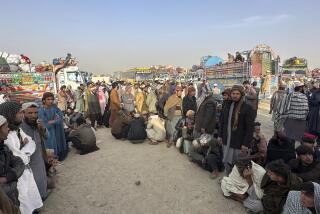Accord Closer on Timing of Soviet Afghan Pullout
- Share via
GENEVA — Afghanistan and Pakistan narrowed their differences over a timetable for withdrawal of Soviet troops from Afghanistan in four days of U.N.-sponsored talks here that broke off Thursday.
Afghan Foreign Minister Abdul Wakil informally proposed a new timetable of 16 months for the withdrawal of all 115,000 Soviet troops, U.N. sources said.
Pakistan’s Foreign Minister Sahabzada Yaqub Khan told reporters after the talks ended Thursday that he countered with a proposal for an eight-month withdrawal period.
Gap Narrowed to 8 Months
At the previous round of talks in March, Afghanistan proposed 18 months and Pakistan seven months. The gap between the two sides thus apparently has narrowed to eight months from the previous 11 months.
U.N. mediator Diego Cordovez said Thursday that he called off the latest round of negotiations, which began Monday, despite the expressed willingness of the Pakistani and Afghan participants to continue.
“I am very disappointed but I think it is better that we break off here and continue our efforts through diplomatic channels,” he told reporters. “I shall be seeing both sides in New York during the (U.N.) General Assembly and we shall be talking again then.”
Cordovez said the two proposals had “narrowed the gap between the two sides but not enough to enable an agreement to be reached” during the so-called “proximity talks.”
Because Pakistan refuses to recognize the Kabul government, the two sides do not meet directly, but instead send their proposals through Cordovez, who travels back and forth along a 300-foot-long corridor between separate rooms in the U.N. European headquarters building.
Sees Timetable as a Key
Cordovez said he believes that an agreement on the timetable would have “a very significant impact on other efforts being made to solve this problem,” but that there are “still some points which remain to be clarified.”
“The most important thing is that they are still communicating,” he said, adding, “The closer you get to a conclusion, the more difficult it is to reach one.”
Cordovez said a date for the next round will be set through diplomatic channels. The talks began in June, 1982.
Pakistan has about 3 million Afghan refugees living along its northwestern frontier, and the main Muslim guerrilla groups fighting the Kabul government are based in Pakistan.
Pakistan has offered to control supplies to the guerrillas only on condition that Soviet troops go home and a neutral, nonaligned government come to power in Kabul.
Transition Regime an Issue
Pakistani sources have said that even if the timetable issue is settled, there would remain the question of the makeup of a transition government to replace the current Communist regime in Kabul.
Soviet leader Mikhail S. Gorbachev has said that ending the Afghanistan conflict and securing the withdrawal of Soviet troops is a Kremlin priority. Soviet troops entered Afghanistan in December, 1979, to support the Marxist government.
More to Read
Sign up for Essential California
The most important California stories and recommendations in your inbox every morning.
You may occasionally receive promotional content from the Los Angeles Times.













